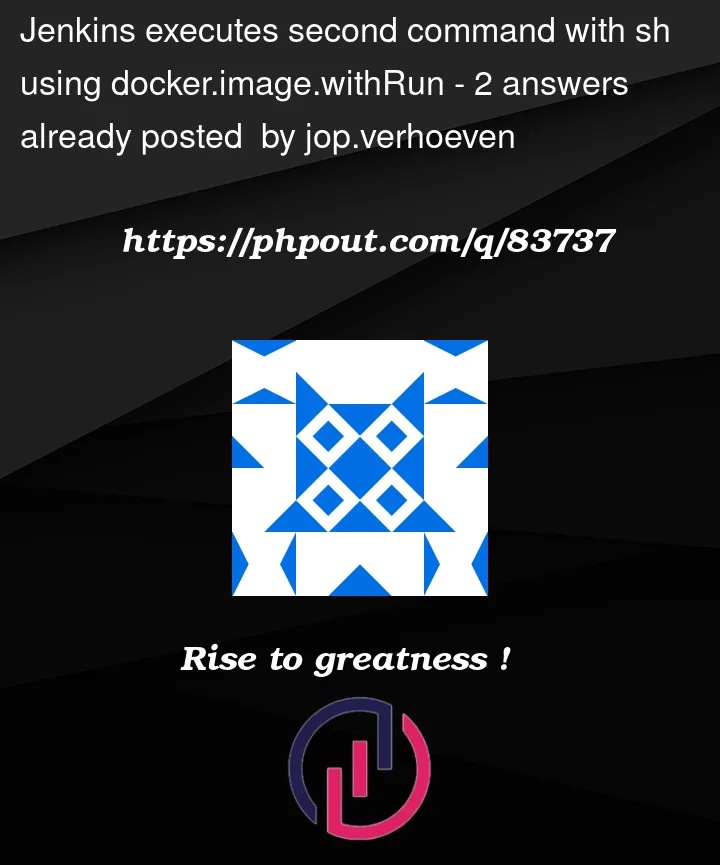I currently have a Jenkins script which starts a Docker container in which the Selenium tests are run using Maven. The Selenium tests are executed successfully, and Maven returns "Build Success".
The problem is as following: Instead of only executing the sh command specified in the Jenkinsfile, Jenkins also executes an unknown second sh command.
As shown in the image, the highlighted part is executed as command, which obviously is not a command, meaning that the Docker container returns error code 127.
Jenkinsfile:
node {
stage('Checkout Code') {
checkout scm
}
try {
withEnv(["JAVA_HOME=${tool 'JDK 11.0'}", "PATH+MAVEN=${tool 'apache-maven-3.x'}/bin", "PATH+JAVA=${env.JAVA_HOME}/bin"]) {
stage('Run Selenide Tests') {
docker.image('selenium/standalone-chrome').withRun('-v /dev/shm:/dev/shm -P') { c->
sh "mvn clean test -Denvironment=${env.Profile} -Dselenide.headless=true -Dselenide.remote=http://" + c.port(4444) + "/wd/hub"
}
}
}
}catch(e){
currentBuild.result = "FAILURE"
throw e
} finally {
stage('Notify Slack Channel of Tests status') {
// Hidden
}
}
}
Console Output (some parts hidden because not relevant):
+ docker run -d -v /dev/shm:/dev/shm -P selenium/standalone-chrome
+ docker port a15967ce0efbda908f6ba9bb7c8c633bb64e54a6557e5c23097ea47ed0540ff9 4444
+ mvn clean test -Denvironment=jenkins -Dselenide.headless=true -Dselenide.remote=http://0.0.0.0:49827
// Maven tests
[INFO]
[INFO] Results:
[INFO]
[INFO] Tests run: 5, Failures: 0, Errors: 0, Skipped: 0
[INFO]
[INFO] ------------------------------------------------------------------------
[INFO] BUILD SUCCESS
[INFO] ------------------------------------------------------------------------
[INFO] Total time: 02:14 min
[INFO] Finished at: 2022-04-14T15:36:38+02:00
[INFO] ------------------------------------------------------------------------
+ :::49821/wd/hub
/var/lib/jenkins/workspace/selenide-tests/test@tmp/durable-58ae7b8f/script.sh: 2:
/var/lib/jenkins/workspace/selenide-tests/test@tmp/durable-58ae7b8f/script.sh: :::49821/wd/hub: not found
+ docker stop a15967ce0efbda908f6ba9bb7c8c633bb64e54a6557e5c23097ea47ed0540ff9
a15967ce0efbda908f6ba9bb7c8c633bb64e54a6557e5c23097ea47ed0540ff9
+ docker rm -f a15967ce0efbda908f6ba9bb7c8c633bb64e54a6557e5c23097ea47ed0540ff9
a15967ce0efbda908f6ba9bb7c8c633bb64e54a6557e5c23097ea47ed0540ff9
ERROR: script returned exit code 127
Finished: FAILURE
Is this a common issue which is easily solvable, or is something wrong with my Jenkinsfile and how can I fix this?
Thanks




2
Answers
After some more digging around the documentation and trying different stuff out, this is what worked for me:
So I replaced
.withRun('-v /dev/shm:/dev/shm -P')with.withRun(-v /dev/shm:/dev/shm -p 4444:4444')and replacedc.port(4444)with theselenideRemotevariable.Removing
c.port(4444)stopped executing the second command in question. Replacing-Pwith-p 4444:4444prevented port 4444 from inside the container to be assigned to a random port on the host, which also prevented the usage ofc.port(4444).It seems the
/wd/hubpart comes from you executed line of code, which leads me to believe that your problem is due to the way you have added quotes.Your line of code is:
Specifically, you open you command with
", then close it afterhttp://with another". I’m guessing Jenkins doesn’t find this acceptable. Try creating the url separatelyand simply using this variable in your executing line
I haven’t used
docker.imagebefore so you might have to play around a bit to get this working.